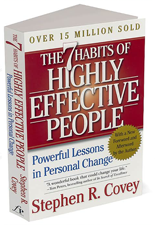Stephen R. Covey, “The 7 Habits of Highly Effective People: Restoring the Character Ethic”
Stephen R. Covey, an internationally respected leadership and management authority, was named one of Time magazine’s 25 most influential Americans. In his book the author outlines practical rules for increasing effectiveness and productivity at work and at home. But before implementing these rules the reader will need to accomplish what Covey calls a “paradigm shift” – a change in perception and interpretation of how the world works. The author will personally take you through this change to let these 7 habits become an integral part of your life.
Top 10 lessons from this book:
- To change ourselves effectively, we first had to change our perceptions.
It’s impossible to turn over a new leaf with an old mindset. Your renewal begins with changing your thoughts, ideas and beliefs.
- First try to understand and then – to be understood.
Most people do not listen with the intent to understand; they listen with the intent to reply. Try to hear and understand others first and then bring your message across.
- Habit is the intersection of knowledge, skill, and desire.
When you know what to do (knowledge), how to do (skill) and you want to do it (desire), this action becomes a habit. Thus, good habits can be formed.
- Each of us guards a gate of change that can only be opened from the inside.
All changes begin inside of us. To let them happen, we don’t need any outer circumstances, we only need to be ready for the change.
- Be proactive.
It means act according to your principles and not the conditions imposed on you.
- Don’t focus on what’s urgent, focus on what’s important.
Set your priorities and always keep them in mind. That way your truly important goals will not be taken up by everyday routine.
- Happiness is the ability to sacrifice what we want for what we want eventually.
Don’t waste your skills, time and effort on fulfilling your everyday desires. Use them for bigger goals – those that truly matter to you.
- Admitting our ignorance is often the first step towards our education.
This also goes for any other problem. Admitting its existence means solving it halfway.
- You can be busy, even very busy, not being effective at the same time.
The result of your work is not measured by the amount of time that you spent on it. Look closely to what results your actions lead.
- Our past experience doesn’t matter. What matters is what we’ve learned from it.
It is not important what happened to you in your life. The main thing is your attitude to this event and the lessons that you’ve drawn.
